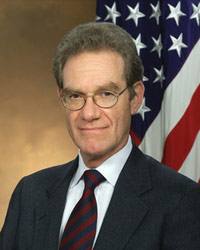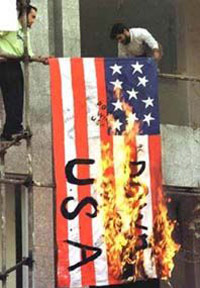|
US Invokes Cold-war Tactics Against Islam: Report
 |
|
“You
do it quietly,” says Baran.
|
CAIRO,
April 20, 2005 (IslamOnline.net) – Dusting off Cold-War tactics, the
US administration has adopted a modified strategy to influence not
only Muslim societies but Islam itself, a leading US magazine has
reported.
From
military psychological-operations teams and CIA covert operatives to
openly funded media and think tanks, Washington is spending tens of
millions of dollars to get the job done properly via the White
House’s Muslim World Outreach strategy, the US News & World
Report said in its 25 April edition.
The
“Hearts, Minds, and Dollars” report said the US government
has embarked on a campaign of political warfare unmatched since the
height of the Cold War.
Realizing
that it poorly reached out to the Muslim world through drawing up tens
of plans and hundreds of ideas to win Muslim hearts and minds, the US
administration is eyeing now third parties in the Muslim world, who
share values like democracy, women's rights, and tolerance.
“You
provide money and help create the political space for moderate Muslims
to organize, publish, broadcast, and translate their work,” Zeyno
Baran, a terrorism analyst at the Nixon Center, who advised on the US
strategy, told the weekly.
Although
US officials say they are wary of being drawn into a theological
battle, the magazine said, many have concluded that America can no
longer sit on the sidelines as radicals and moderates fight over the
future of a religion with over a billion followers.
Who
is Moderate?
 |
|
“That's
how we're thinking. . . . It's something we talk about all the
time,” says Rodman.
|
The
strategy, however, failed to cite names of figures it considers as
“moderates,” whether they are liberal- or –conservative-minded
figures.
But
it was crystal clear in naming certain Muslim schools it wanted to
uproot like Saudi Wahhabism.
It
said that the Saudis are estimated to have spent up to $75 billion since
1975 to expand “their fundamentalist sect, Wahhabism, worldwide.”
“The
kingdom has funded hundreds of mosques, schools, and Islamic centers
abroad,” it said.
The
strategy, meanwhile, recommends making peace with Muslim groups that
eschew violence and are at odds with Al-Qaeda, like the Muslim
Brotherhood.
“I
can guarantee that if you go to some of the unlikely points of contact
in the Islamic world, you will find greater reception than you
thought,” Milt Bearden, whose 30-year CIA career included long
service in Muslim societies, told the US magazine.
“The
Muslim Brotherhood is probably more a part of the solution than it is
a part of the problem.”
The
weekly further revealed that US intelligence officers have been
meeting not only with Muslim Brotherhood members, but also leaders of
other likeminded groups.
Cold-war
Style
 |
|
The
weekly said anti-Americanism now reaches across every strata of
the Muslim world.
|
As
it did during the Cold War, the US administration has fielded a
worldwide network of propagandists, publicists, and payoff artists.
It
is convinced that using music, comics, poetry, and the Internet is the
best way to get across America’s views to the Arab world.
The
administration kicked off major new initiatives in foreign
broadcasting--Radio Sawa, a pop music-news station in 2002, and
Alhurra, a satellite-TV news network in 2004, both aimed at Arab
audiences.
The
US weekly cited reports that US officials have peddled fake video news
reports and paid columnists to boost policies “here at home”.
The
aim is to break off moderate Muslims from radicals as it did during
the Cold War when it pitted moderate socialists against hard-core
Communists.
“That’s
how we’re thinking… It’s something we talk about all the
time,” Peter Rodman, the Pentagon’s assistant secretary of defense
for international security affairs, told the weekly.
“In
those days, it was covert. Now, it's more open.”
An
administration official admitted that the current ideological war was
more difficult than the Cold War.
“The
Cold War was easy. It was a struggle against a godless political
ideology. But this has theological elements,” he said.
“It
goes to the core of American belief that we don’t mess with freedom
of religion. Do we have any authority to influence this debate?” he
asked.
“You
do it quietly,” answered Zeyno Baran.
Politicized
Aid
The
US Agency for International Development (USAID) features high on the
strategy.
Records
reveal that several projects were funded by the US aid in as many as
24 Muslim countries like Egypt, Pakistan and Kyrgyzstan.
Also
being funded: media of all sorts, from book translations to radio and
TV in at least a half-dozen nations.
An
Arabic version of Sesame Street has become one of the most
popular shows on Egyptian TV, and along with lessons on literacy and
hygiene, the program stresses values of religious tolerance.
In
Bangladesh, USAID is training mosque leaders on development issues.
In
Madagascar, the embassy even sponsored an inter-mosque sports
tournament.
In
no country is the effort more pronounced than Indonesia, the world's
largest Muslim nation.
Working
behind the scenes, USAID now helps fund over 30 Muslim organizations
in the country, the weekly said.
Among
the programs: media production, workshops for Islamic preachers, and
curriculum reform for schools from rural academies to Islamic
universities.
Chaotic,
Not Working
Despite
the surge of activity, Washington's efforts to win hearts and minds
remain chaotic and anti-Americanism now reaches across every strata of
the Muslim world, the weekly said.
A
March report by the Center for Strategic and International Studies
concluded that US-Arab relations are at their lowest point in
generations.
A
Government Accountability Office report released this month criticized
the administration as failing to develop a strategy to improve the
image of the United States.
The
Washington Post said Monday, April 18,
that one of the main reasons that led to the “chaos” was that the
US government has not tapped into its own Muslim minority as part of
the global outreach.
According
to the paper, Islam is the fastest-growing religion in the United
States and is expected to become the second-largest religious bloc in
the country in the next few years.
Despite
this, the administration has put only two US Muslims in top jobs.
Like
Dina Powell, the new No. 2 official in charge of public diplomacy, who
is Egyptian American, most Arabs in the administration are Christians.
|